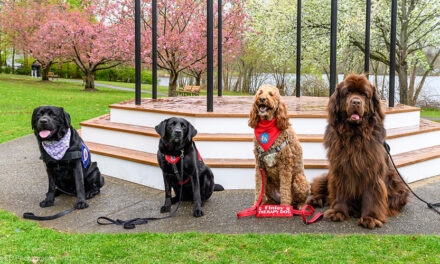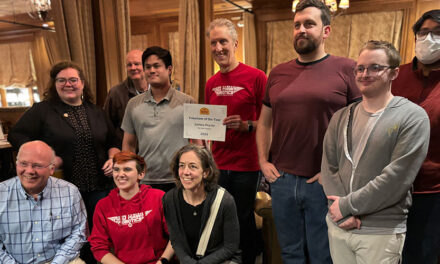Published November 2, 2018
MELROSE — Rabbi Artie Fertig wrote about the need for community this week after a historic Jewish neighborhood in Pittsburgh was torn apart Saturday when 11 congregants died at the hands of a twisted, hate-filled gunman inside Tree of Life Synagogue.
The religious leader of Melrose’s Temple Beth Shalom on East Emerson Street posted some sentiments on the temple’s website the day after the tragedy.
“Together we are outraged by the vicious anti-Semitic gunman who killed 11, including two brothers and a husband and wife, and injured more while they were simply gathered for a Shabbat service and to name a newborn baby at the Tree of Life – Or L’Simcha congregation in Pittsburgh (Saturday).
“When we gather to worship on Shabbat, we say to each other ‘Shabbat Shalom!’ – ‘Sabbath greetings/peace.’ When we rejoice at the birth of an infant, we look ahead filled with optimism and hope, never expecting to witness or experience violence and death at that very moment. Our expectations have been upended, our joy and peace turned to dismay and sorrow.
“The Talmud teaches that all Jews are bound, one to the other, an observation never truer than in times like these. That is why we (gathered for a) community discussion at our congregation Monday (October 29). We need to be together, to help one another process this tragedy, to stand with one another to confront the hatred that plagues our society, to support one another as we shed tears of grief and to simply silently hold hands and offer a few prayers….
“We share a deep sense of loss for the victims’ families, and solidarity with the Tree of LIfe congregation, and the greater Pittsburgh Jewish community. We are grateful for the many civic, religious and community leaders and people of good will of all faiths locally and throughout the world who have issued statements of support.
“This incident occurred within a context. According to the ADL, anti-Semitic incidents in the U.S. surged 57 percent in 2017, the largest year-on-year increase since the Jewish civil rights group began collecting data in 1979. It appears that 2018 will see even greater numbers of incidents and violence. Indeed, the hatred we witnessed last year in Charlottesville continues to burn within the hearts of too many in our nation.
“Rabbi David Ellenson, the Interim President and Chancellor Emeritus of Hebrew Union College-Jewish Institute of Religion shared this message (last Saturday):
“‘Tomorrow will be a day of reckoning for the toxicity plaguing our world and how to go about repairing it. Tonight we remember the words of the Shulchan Aruch that state that it may not be possible to comfort mourners in the moment of their rawest grief. Instead, we dwell in the valley of tears, recalling our fallen sisters and brothers who were killed in this horrific tragedy. Tehyenah nafshoteihen tzrurot bi-tzror hahayim – may the souls of those murdered in Pittsburgh today be bound up in the bond of eternal life.’”
—————
Meanwhile, in Pittsburgh, members of the city’s grief-stricken Jewish community endured another round of funerals Wednesday for victims of the synagogue massacre, a day after President Donald Trump encountered hundreds of protesters when he came to town to pay his respects.
Melvin Wax, 87, Irving Younger, 69, and Joyce Fienberg, 75, were to be laid to rest as part of a weeklong series of services for the 11 people killed in a shooting rampage at the Tree of Life synagogue Saturday. It was the deadliest attack on Jews in U.S. history.
“It can’t be fixed,” Robert Libman said at the funeral of Fienberg, his sister, clutching his chest as he described the pain of losing her. “My sister is dead. My sister was murdered. There was no one I know like her. Pure goodness. … She was the most tolerant and gentle person that I’ve ever known.”
Her sons, Anthony, of Paris, and Howard, of Vienna, Virginia, said she spent five years caring for their father as he battled cancer, then after his death a few years ago, devoted more of her time and energy to Tree of Life.
“My mom would be very angry that her funeral wasn’t able to be at Tree of Life, and that her friends lost Saturday couldn’t be here,” Howard Fienberg said.
The funerals for Wax and Younger were to be held later Tuesday.
Six people were wounded in the attack, including four police officers, two of whom remained hospitalized with gunshot wounds. Two congregants were still in the hospital, one in critical condition.
In a bit of good news, hospital officials said the two most seriously injured shooting victims are improving.
A police officer and a congregant remain in intensive care but “are doing much better now,” Dr. Donald Yealy, chairman of emergency medicine at UPMC, said Wednesday. “I think overall the prognoses are good now. But each of them, in a varying way, will have a different trajectory and likely will require a series of ongoing care.”
With Tree of Life still cordoned off as a crime scene, the man arrested in the attack, 46-year-old truck driver Robert Gregory Bowers, remains behind bars, awaiting a hearing Thursday on federal hate-crime charges that could bring the death penalty. Authorities said he raged against Jews during the attack.
The first three funerals were held on Tuesday, with thousands of mourners jamming a synagogue, a Jewish community center and a third, undisclosed site for the funerals of a beloved family doctor, a pillar of the congregation, and two intellectually disabled brothers in the 50s who were known as “the boys.”
Cecil and David Rosenthal were “beautiful souls” who had “not an ounce of hate in them — something we’re terribly missing today,” Rabbi Jeffrey Myers, a survivor of the massacre, said at their funeral at Rodef Shalom, one of the city’s oldest and largest synagogues.
The brothers were both active at Tree of Life, with Cecil the more gregarious of the two, a man with a booming voice who was known as the “mayor” of the city’s Squirrel Hill neighborhood and the “town crier” for the gossip he managed to gather.
“They were innocent like boys, not hardened like men,” the Rosenthals’ sister, Diane Hirt, told mourners.
On Tuesday afternoon, after the day’s funerals were over, Trump and first lady Melania Trump arrived in Pittsburgh to shouting, chanting protesters with signs such as “It’s your fault” and “Words matter,” a reference to allegations that Trump’s combative language has emboldened bigots. Pennsylvania Gov. Tom Wolf and Pittsburgh Mayor Bill Peduto, both Democrats, declined to join him during the visit.
“He didn’t pull the trigger, but his verbiage and actions don’t help,” said Squirrel Hill resident Paul Carberry, 55, wearing anti-Trump patches on his hat and jacket.
Another Squirrel Hill resident, Shayna Marcus, a Jewish 34-year-old nurse and Trump supporter who hoped to catch sight of the presidential motorcade, said: “I don’t think focusing on Trump is the answer, or on politics.”
One person was arrested during the protests.
During their visit, Trump and the first lady lit candles at Tree of Life for the victims and laid white roses as well as stones for each of the dead, a Jewish burial tradition. They later went to a hospital to visit with survivors.
They were joined by Trump’s daughter Ivanka and her husband, Jared Kushner, as well as Myers, the Tree of Life rabbi, and Israeli Ambassador Ron Dermer.
A private funeral was conducted Tuesday for Daniel Stein, the 71-year-old men’s club president at Tree of Life. And a service with more than 1,000 people was held for Dr. Jerry Rabinowitz at the Jewish Community Center in Squirrel Hill.
The 66-year-old Rabinowitz was a go-to doctor for HIV patients in the epidemic’s early and desperate days, a physician who always hugged his patients as they left his office.
“A lot of people are feeling really angry about this. A lot of rage built up inside about this, because of it being a hate crime. Don’t get me wrong; I do. But I’m so overwhelmed with sadness right now that I can’t even be angry right now,” said Robin Faulkner, whose family had seen Rabinowitz for 30 years and counted him as a dear friend. “It’s just such a loss. Just tragic.”
Among the mourners at the Rosenthal brothers’ funeral was Dr. Abe Friedman, who typically sat in the back row of Tree of Life with the two men but was late to synagogue on Saturday and was not there when the gunman opened fire.
As he stood in line at the funeral, Friedman wondered why he had been spared.
“Why did things fall into place for me?” he asked. “I usually sit in the back row. In the last row, everyone got killed.”
— The Associated Press contributed to this report.




